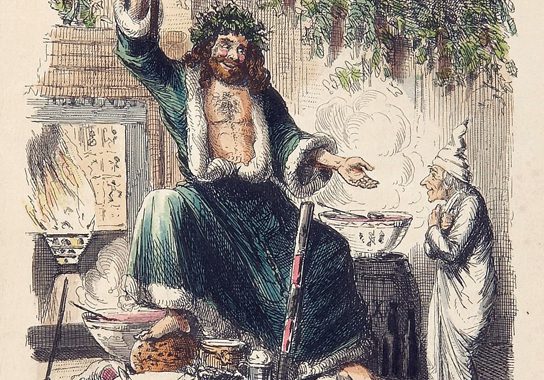Becoming His Brother’s Keeper

In John Steinbeck’s novel Winter of Our Discontent, businessman Ethan Hawley is haunted by the presence of the town drunkard—his childhood friend, Danny Taylor. Once like brothers, the two men’s paths slowly diverged over time. Now, Hawley watches his old friend succumb to squalor and self-abuse. He cannot forget his guilt.
It reminded me of old Scrooge: Dicken’s “squeezing, wrenching, grasping, scraping, clutching, covetous, old sinner,” who lived with squalor and illness on his doorstep, yet didn’t care. He couldn’t see over his insurmountable mountain of greed.
Our current lives are filled with Ethans and Dannys, Scrooges and Tiny Tims. Take Mike Remboulis: he and his half-brother grew up in the same Queens apartment, but their fortunes have changed drastically over the years. New York Times reporter Rachel Swarns shared their story last Sunday:
Even amid lighthearted banter and savory plates, reality almost always comes rushing back: Beyond those restaurant doors, his big brother is teetering on the edge, barely hanging on. Mr. Remboulis, 51, is an aerospace engineer with a graduate degree. His half-brother, Glenn Yuzzi, 59, is a carpenter with a high school diploma. They grew up in the same Queens apartment, but today they live on opposite sides of the economic divide. It is a twist of fortune that haunts Mr. Remboulis. “I don’t want him to scrape by,” he said. “I don’t want my brother to drown.”
It seems these unfair disparities become more prominent in the American mind around Christmastide. After all, it’s freezing cold outside in most of America. Most of us are huddled in coats and scarves, drinking coffee, thinking about presents, food, and parties. In the midst of this happy holiday reverie, we see a man slumped on the street corner, McDonalds cup sitting empty at his side. Even if one isn’t surrounded by the homeless, it’s almost impossible to live in a town or city without knowing at least one family whose fortunes have fallen on bad times. We grow up hearing so much about “Christmas spirit”—the spirit of giving that supposedly animates and transports us during the Christmas season. We read The Christmas Carol and How the Grinch Stole Christmas, frown disapprovingly at the money-grubbing fiends.
Steinbeck set the advent of his novel on Good Friday. There’s death in the air. Over Friday and Saturday, change stirs in Ethan Hawley. But it isn’t change of a good kind. His money lust is awakening. From Saturday evening to Sunday morning, the morning of resurrection, Hawley begins to see himself as a snake that has just shed its skin. He’s transformed.
It reminded me of old Scrooge: he awakens on Christmas morning after a haunted nighttime vigil with ghosts. He is also transformed—but by losing his old self, completely rebirthed into newness: “I don’t know what day of the month it is!” said Scrooge. “I don’t know how long I’ve been among the Spirits. I don’t know anything. I’m quite a baby. Never mind. I don’t care. I’d rather be a baby.” Scrooge scatters his money like dust to the wind, overflowing with generosity and joy. To Tiny Tim, “he was a second father.”
Who will we be this Christmas? I scurry down cold city streets and see the pleading eyes, listen to stories of families “getting by.” Part of me wants to bark out like Cain, “Am I my brother’s keeper?”
But that’s what the Christmas story is about: the One who had everything became nothing, to save the lost brother. He bore poverty, sorrow, and shame in the winter of our discontent. And He promised us that, like Scrooge, we could be “born again.” He wouldn’t let us drown.
He truly was “better than his word. He did it all, and infinitely more.”
Comments